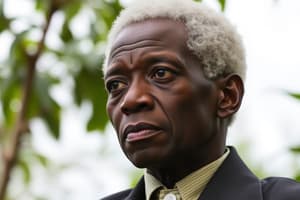Podcast
Questions and Answers
What culture does 'Things Fall Apart' represent and contrast with the British colonial culture?
What culture does 'Things Fall Apart' represent and contrast with the British colonial culture?
Igbo culture
In which country and village is 'Things Fall Apart' set?
In which country and village is 'Things Fall Apart' set?
Nigeria, Igbo village
What is the novel's focus regarding the impact of colonialism and imperialism?
What is the novel's focus regarding the impact of colonialism and imperialism?
Cultural representation, character analysis, themes, narrative style, and the roles of colonialism and imperialism
How does Achebe portray the Igbo culture in 'Things Fall Apart'?
How does Achebe portray the Igbo culture in 'Things Fall Apart'?
What does Achebe's characterization challenge in 'Things Fall Apart'?
What does Achebe's characterization challenge in 'Things Fall Apart'?
What are some key themes explored in 'Things Fall Apart'?
What are some key themes explored in 'Things Fall Apart'?
Describe Achebe's narrative style in 'Things Fall Apart'.
Describe Achebe's narrative style in 'Things Fall Apart'.
How does 'Things Fall Apart' critique colonialism and imperialism?
How does 'Things Fall Apart' critique colonialism and imperialism?
What does the portrayal of Igbo characters in 'Things Fall Apart' reveal?
What does the portrayal of Igbo characters in 'Things Fall Apart' reveal?
What is the significance of the role of the individual in 'Things Fall Apart'?
What is the significance of the role of the individual in 'Things Fall Apart'?
Flashcards are hidden until you start studying
Study Notes
Literature Things Fall Apart Novel
Chinua Achebe's "Things Fall Apart" is a groundbreaking novel that explores the impact of colonialism and imperialism on African culture and society. The novel, published in 1958, is set in an Igbo village in Nigeria and delves into the clash of cultures between the traditional African way of life and the influence of British imperialism. This article will discuss the novel's focus on cultural representation, character analysis, themes, narrative style, and the roles of colonialism and imperialism.
Cultural Representation
"Things Fall Apart" represents the Igbo culture and its contrast with the British colonial culture. The novel highlights the rich cultural heritage and social stability of the Igbo people before the arrival of the British. Achebe's portrayal of the Igbo culture is complex and nuanced, showing the unique aspects of their society, such as their religious practices, family life, and daily routines. The novel also examines the impact of British imperialism on the Igbo culture, as the colonialists attempt to impose their ways on the African people.
Character Analysis
The novel features a variety of well-developed characters, each with their own unique traits and perspectives. Achebe's characterization challenges the stereotypes of African characters often seen in colonial literature, such as Conrad and Cary's novels. Instead, the Igbo characters are portrayed as highly individual, with many of them open to new ideas. The colonialists, on the other hand, are depicted as rigid and driven by imperialistic intentions.
Themes
"Things Fall Apart" explores several key themes, including the clash of cultures, the decay of traditional values, and the consequences of cultural confluence. The novel also examines the destructive impact of colonization on African societies, as well as the universal human issue of failing to respect diversity and autonomy. Additionally, the novel highlights the role of the individual in resisting and adapting to the changes brought by colonialism and imperialism.
Narrative Style
Achebe's narrative style in "Things Fall Apart" is marked by its use of vivid language and detailed descriptions, which allow the reader to immerse themselves in the world of the Igbo people. The novel is structured around the daily routines of the people, their family life, and the events that shape their society. The narrative style serves to emphasize the unique aspects of the Igbo culture and the complexity of the colonial encounter.
Colonialism and Imperialism
"Things Fall Apart" critiques the destructive influence of colonization and imperialism on African societies, as the British colonialists forcefully impose their ways on the Igbo people. The novel demonstrates the disastrous results that ensue when a dominant culture, driven by hubris and ethnocentrism, forcefully imposes itself upon another, leading to cultural erosion and the decay of traditional values. The story also highlights the importance of respecting diversity and autonomy, as the clash of cultures ultimately reveals the human blindness that can lead to the destruction of rich cultural heritage.
In conclusion, "Things Fall Apart" is a profound exploration of the impact of colonialism and imperialism on African culture and society, as well as the universal struggle to preserve individuality and cultural identity in the face of oppressive forces. The novel's portrayal of the Igbo culture, character analysis, themes, and narrative style make it a vital contribution to the understanding of African literature and the complexities of cultural encounter.
Studying That Suits You
Use AI to generate personalized quizzes and flashcards to suit your learning preferences.




